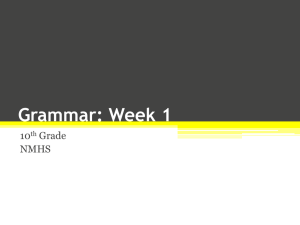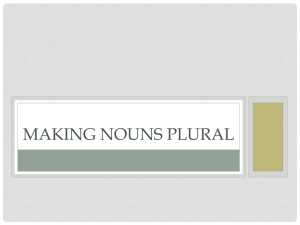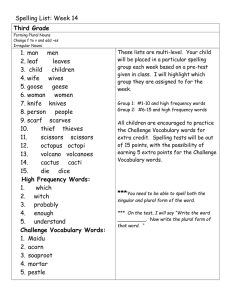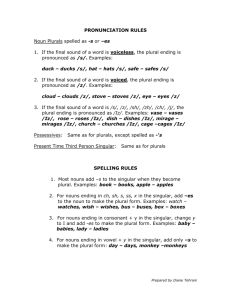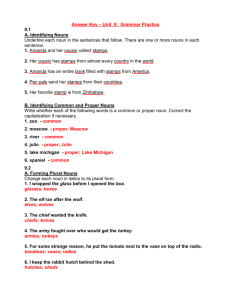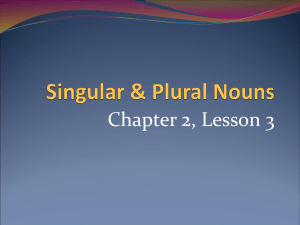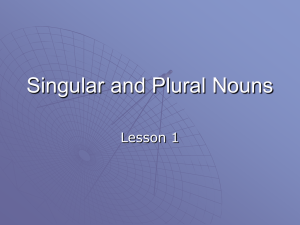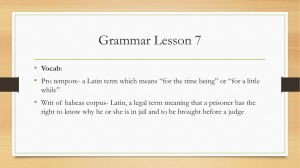Singular And Plural Nouns
advertisement
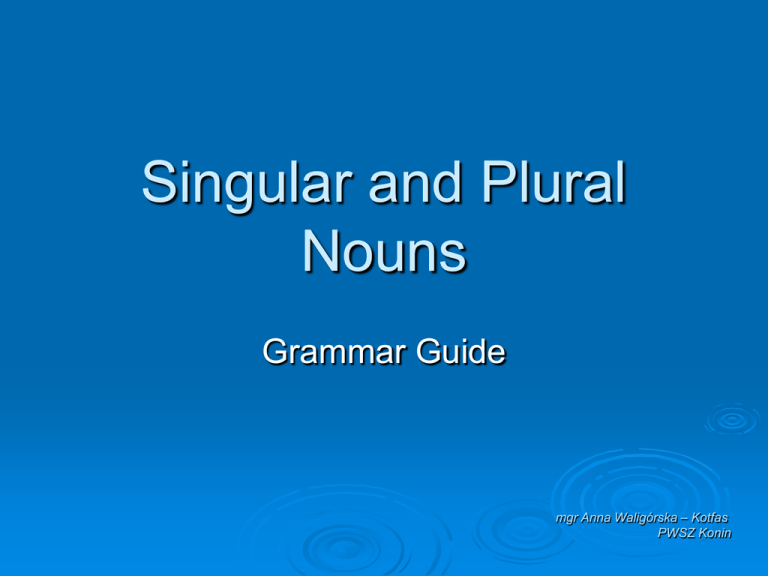
Singular and Plural Nouns Grammar Guide mgr Anna Waligórska – Kotfas PWSZ Konin A noun is: a person: a teacher / a chef / a student / a doctor a place: a city / a school / a beach / a kitchen a thing: a bus / a table / a cow / a bed / a house Common Nouns and Proper Nouns A noun that names any person, place, or thing is a common noun. a house A noun that names a particular person, place, or thing is a proper noun. the White House Singular and Plural Nouns A noun that names only one person, place, or thing is called a singular noun. A noun that names more than one person, place, or thing is called a plural noun. a pencil pencils Plural Nouns: Rules Most English nouns form the plural with –s. road roads bag bags town towns girl girls truck trucks Plural Nouns: Rules If the singular form ends in s / x / z / ch / sh, the plural is made by and adding –es church churches crash crashes bus buses box boxes dish dishes Plural Nouns: Rules If the singular form ends in consonant + y, the plural is made by changing y to i and adding –es baby babies lady ladies party parties ferry ferries Plural Nouns: Rules If the singular form ends in vowel + y, the plural is made by adding –s day days boy boys donkey donkeys key keys toy toys Plural Nouns: Rules If the singular form ends in consonant + o, the plural is made by adding –es potato potatoes tomato tomatoes hero heroes But: Some words ending in consonant + o, especially words from other languages, take –s only photo photos piano pianos kilo kilos Plural Nouns: Rules If the singular form ends in vowel + o, the plural is made by adding –s radio radios video videos zoo zoos Plural Nouns: Rules If the singular form ends in –f / –fe , the plural is usually made by adding –ves calf calves half halves life lives leaf leaves But: Several words ending in –f and all those ending –ff just take –s: chief chiefs belief beliefs cliff cliffs Some words ending in –f take either plural ending: scarf scarfs/scarves. You can check irregular plurals in a dictionary. Plural Nouns: Irregulars Some nouns have special plural forms. Since these words follow no special pattern, you must learn them. person child man /mæn/ woman /ˈwʊmən/ foot tooth mouse goose people children men /men/ women /ˌwɪm.ɪn/ feet teeth mice geese Nouns with no Singular Form Some English nouns are more common in the plural form. These occur in a number of categories: clothing: clothes, jeans, trousers, pyjamas, tools/equipment: scissors, glasses (= spectacles), handcuffs games: dominoes, darts, cards, bowls subjects/activities: physics, maths, politics, economics, aerobics, athletics other: goods, remains, thanks, stairs, police These nouns may have a singular form with a different meaning, e.g.: a glass (= wine glass).
